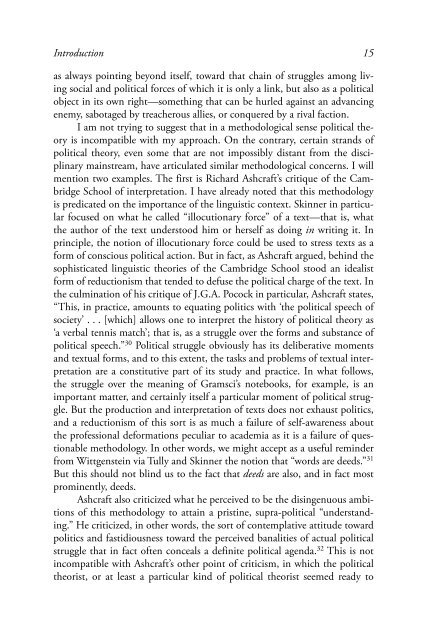Gramsci and Trotsky in the Shadow of Stalinism: The ... - Indymedia
Gramsci and Trotsky in the Shadow of Stalinism: The ... - Indymedia
Gramsci and Trotsky in the Shadow of Stalinism: The ... - Indymedia
- No tags were found...
Create successful ePaper yourself
Turn your PDF publications into a flip-book with our unique Google optimized e-Paper software.
Introduction 15as always po<strong>in</strong>t<strong>in</strong>g beyond itself, toward that cha<strong>in</strong> <strong>of</strong> struggles among liv<strong>in</strong>gsocial <strong>and</strong> political forces <strong>of</strong> which it is only a l<strong>in</strong>k, but also as a politicalobject <strong>in</strong> its own right—someth<strong>in</strong>g that can be hurled aga<strong>in</strong>st an advanc<strong>in</strong>genemy, sabotaged by treacherous allies, or conquered by a rival faction.I am not try<strong>in</strong>g to suggest that <strong>in</strong> a methodological sense political <strong>the</strong>oryis <strong>in</strong>compatible with my approach. On <strong>the</strong> contrary, certa<strong>in</strong> str<strong>and</strong>s <strong>of</strong>political <strong>the</strong>ory, even some that are not impossibly distant from <strong>the</strong> discipl<strong>in</strong>aryma<strong>in</strong>stream, have articulated similar methodological concerns. I willmention two examples. <strong>The</strong> first is Richard Ashcraft’s critique <strong>of</strong> <strong>the</strong> CambridgeSchool <strong>of</strong> <strong>in</strong>terpretation. I have already noted that this methodologyis predicated on <strong>the</strong> importance <strong>of</strong> <strong>the</strong> l<strong>in</strong>guistic context. Sk<strong>in</strong>ner <strong>in</strong> particularfocused on what he called “illocutionary force” <strong>of</strong> a text—that is, what<strong>the</strong> author <strong>of</strong> <strong>the</strong> text understood him or herself as do<strong>in</strong>g <strong>in</strong> writ<strong>in</strong>g it. Inpr<strong>in</strong>ciple, <strong>the</strong> notion <strong>of</strong> illocutionary force could be used to stress texts as aform <strong>of</strong> conscious political action. But <strong>in</strong> fact, as Ashcraft argued, beh<strong>in</strong>d <strong>the</strong>sophisticated l<strong>in</strong>guistic <strong>the</strong>ories <strong>of</strong> <strong>the</strong> Cambridge School stood an idealistform <strong>of</strong> reductionism that tended to defuse <strong>the</strong> political charge <strong>of</strong> <strong>the</strong> text. In<strong>the</strong> culm<strong>in</strong>ation <strong>of</strong> his critique <strong>of</strong> J.G.A. Pocock <strong>in</strong> particular, Ashcraft states,“This, <strong>in</strong> practice, amounts to equat<strong>in</strong>g politics with ‘<strong>the</strong> political speech <strong>of</strong>society’ . . . [which] allows one to <strong>in</strong>terpret <strong>the</strong> history <strong>of</strong> political <strong>the</strong>ory as‘a verbal tennis match’; that is, as a struggle over <strong>the</strong> forms <strong>and</strong> substance <strong>of</strong>political speech.” 30 Political struggle obviously has its deliberative moments<strong>and</strong> textual forms, <strong>and</strong> to this extent, <strong>the</strong> tasks <strong>and</strong> problems <strong>of</strong> textual <strong>in</strong>terpretationare a constitutive part <strong>of</strong> its study <strong>and</strong> practice. In what follows,<strong>the</strong> struggle over <strong>the</strong> mean<strong>in</strong>g <strong>of</strong> <strong>Gramsci</strong>’s notebooks, for example, is animportant matter, <strong>and</strong> certa<strong>in</strong>ly itself a particular moment <strong>of</strong> political struggle.But <strong>the</strong> production <strong>and</strong> <strong>in</strong>terpretation <strong>of</strong> texts does not exhaust politics,<strong>and</strong> a reductionism <strong>of</strong> this sort is as much a failure <strong>of</strong> self-awareness about<strong>the</strong> pr<strong>of</strong>essional deformations peculiar to academia as it is a failure <strong>of</strong> questionablemethodology. In o<strong>the</strong>r words, we might accept as a useful rem<strong>in</strong>derfrom Wittgenste<strong>in</strong> via Tully <strong>and</strong> Sk<strong>in</strong>ner <strong>the</strong> notion that “words are deeds.” 31But this should not bl<strong>in</strong>d us to <strong>the</strong> fact that deeds are also, <strong>and</strong> <strong>in</strong> fact mostprom<strong>in</strong>ently, deeds.Ashcraft also criticized what he perceived to be <strong>the</strong> dis<strong>in</strong>genuous ambitions<strong>of</strong> this methodology to atta<strong>in</strong> a prist<strong>in</strong>e, supra-political “underst<strong>and</strong><strong>in</strong>g.”He criticized, <strong>in</strong> o<strong>the</strong>r words, <strong>the</strong> sort <strong>of</strong> contemplative attitude towardpolitics <strong>and</strong> fastidiousness toward <strong>the</strong> perceived banalities <strong>of</strong> actual politicalstruggle that <strong>in</strong> fact <strong>of</strong>ten conceals a def<strong>in</strong>ite political agenda. 32 This is not<strong>in</strong>compatible with Ashcraft’s o<strong>the</strong>r po<strong>in</strong>t <strong>of</strong> criticism, <strong>in</strong> which <strong>the</strong> political<strong>the</strong>orist, or at least a particular k<strong>in</strong>d <strong>of</strong> political <strong>the</strong>orist seemed ready to
















